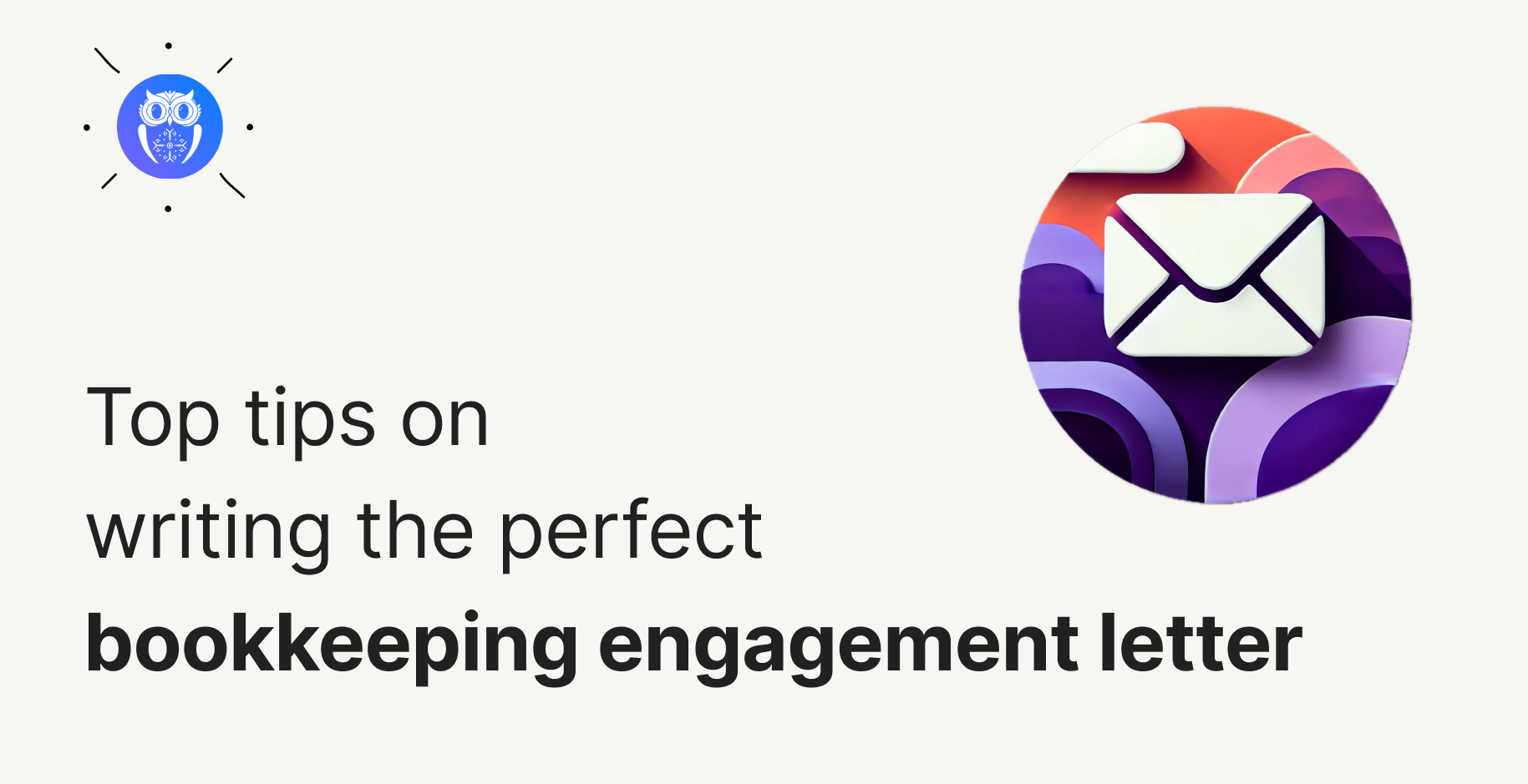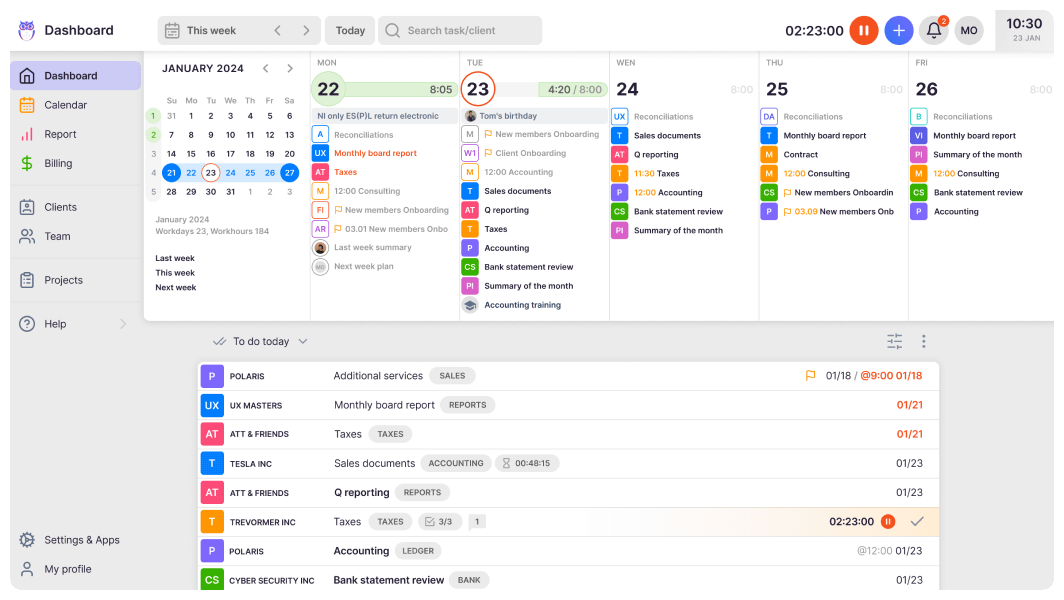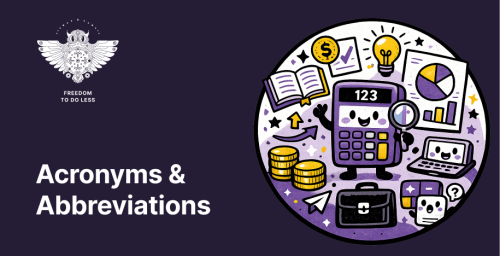A bookkeeper or accountant is best at providing accounting services. But you cannot provide a service if you don’t have any clients. A bookkeeping engagement letter is the first contact between an accountant and their client and needs to leave a good impression. But how to write the best reliable and inviting bookkeeping engagement letter?
What is a Bookkeeper Engagement Letter?
It’s a contract or written agreement between you, as a bookkeeper or accountant, and your clients. The engagement letter is something you send to make sure a potential client knows what to expect from you and what they need to do.
The letter includes your services, expectations for both, all of the work you’ll do for the client and much more, if needed, to keep you both on the same page. Without an engagement letter, there is no start to your partnership.
Why Are Bookkeeping Letters of Engagement Necessary?
First impressions matter the most, as we all know. The law applies to client-accountant relationships. An engagement letter is likely your first contact with your potential client.
If you leave a good impression, the client will probably choose you as their service provider. Even if others offer a better price, the human touch is often a better motivator.
A bookkeeping engagement letter also allows you to set the standard for your clients. Yes, a client is king, but I’m sure you, as an accountant, also have your requirements for a client.
The letter provides legal protection for both parties, as setting clear and written expectations minimizes the risk of disputes.
Best Practices for Bookkeeping Engagement Letters
When writing a bookkeeping engagement letter, you must balance transparency and professionalism.
Demonstrate the accounting services you offer
First and foremost, clearly define the scope of your services. Specify whether you’ll handle bank reconciliations, financial statement preparation, payroll processing, or other tasks, leaving no room for assumptions or misunderstandings. A well-drafted engagement letter should remove any confusion by outlining what the client can expect, which helps prevent scope creep or confusion later.
What is scope creep in the accounting world?
You offer a service to your client, let’s say bank reconciliations, and they agree to that in the contract. Yet, they are always calling you with spontaneous questions or sending emails with extra tasks you have never agreed upon. Therefore, you have no legitimate reason to ask for money for it. Even though it might seem little initially, you’ll soon notice that it takes up a lot of time in a month. That’s scope creep – you work for free.
We recommend using time and billing or work management software with time-tracking features. When tracking working time for each task, you’ll know exactly how long these tiny extra questions take.
Uku even has a Magic Button that helps you start tracking time for a new task immediately when a client calls, stopping the timer for the task you were tracking time for.
Outline the accounting firm client’s responsibilities
It’s equally important to be precise about the responsibilities of both parties, the accountant and the client.
For example, while your role might involve processing transactions or preparing financial statements, the client must understand their obligation to provide timely and accurate documentation. All accountants know clients could be better at forwarding the needed information.
Laying out these responsibilities in the bookkeeping engagement letter ensures everyone knows what to expect, creating a foundation of mutual trust and accountability. It also protects the bookkeeper from the client’s rage when work isn’t done on time.
Don’t leave payment terms a question
Billing terms are another critical element. Your engagement letter should clearly define the following:
- How much you’ll charge?
- When payments are due?
- What happens in case of late payments?
Address any potential out-of-pocket expenses that could arise, such as software subscriptions or additional consulting services, and spell these terms so that there is no room for disputes. Clearly outlining the payment initiation process helps avoid any misunderstandings and keeps the payment flow straightforward for both parties.
Lastly, include confidentiality clauses to protect your client’s sensitive information and establish clear guidelines for dispute resolution and contract termination.
5 Simple Tips to Write the Best Letter of Engagement as a Bookkeeper
Start with a sample engagement letter or a template
Using a professionally developed accounting email template ensures all the essential components are included, saving time and reducing the chance of overlooking something important.
Customize each client’s engagement letter for bookkeeping
Tailor the letter to each client’s specific needs rather than sticking with generic language, and taking cues from examples of email signatures to maintain a professional and consistent tone. Personalized communication strengthens your client relationships.
Review and revise the engagement letter
Always proofread the letter for accuracy and clarity before finalizing it. Avoid errors that could undermine your professionalism.
Use formal language with proper accounting terms
Keep the tone professional and avoid using abbreviations or informal language, which can detract from the seriousness of the agreement.
Incorporate automation tools
Use bookkeeping or accounting practice management software with automated email functions. The software makes creating and managing engagement letters effortless, ensuring consistency and reducing manual effort.
What to Avoid When Writing Accounting Services Engagement Letters?
Writing a bookkeeping engagement letter might seem straightforward, but there are common mistakes you should avoid.
Keep the engagemet letter simple
One of them is not being straightforward enough. Writing and using big words is fun, yet your clients might miss the point. Phrases like “handle bookkeeping” are insufficient; be specific about each task to ensure there’s no room for misinterpretation.
Make the letter simple. A concise document that clearly outlines the key elements—without excessive legal lingo or irrelevant clauses — is more likely to be understood and agreed upon by the client. Simplicity and precision go a long way in ensuring both parties are on the same page from the outset.
Don’t use it as email marketing for accountants
You shouldn’t turn the bookkeeping engagement letter into a marketing opportunity. Although promoting your services is important, there are better places for upselling. Its purpose is to define the relationship, expectations, and terms, not highlight all the additional ways you could assist.
Bookkeeping Engagement Letter Template
[Your Firm’s Name]
[Address]
[City, State, Zip]
[Date]
[Client’s Name]
[Client’s Address]
[City, State, Zip]
Dear [Client’s Name],
This letter outlines the terms and conditions of the bookkeeping services to be provided by [Your Firm’s Name] to [Client’s Name] as of [Start Date]. This engagement aims to set clear expectations and avoid misunderstandings in our professional relationship.
Scope of Services
We will provide the following bookkeeping services for [Client’s Name]:
- Monthly bank and credit card reconciliations.
- General ledger maintenance.
- Preparation of financial statements (profit & loss, balance sheet).
- Payroll processing (if applicable).
- Tax filing preparation (as requested).
Compensation and Payment Terms
Our fee for the services provided will be [Hourly Rate/Flat Monthly Fee] of $[Amount]. Invoices will be issued on [Billing Date] each month and are due within [Number of Days] days. Late payments may incur a fee of [Percentage]% per month.
Term and Termination
This agreement will commence on [Start Date] and continue until [End Date] or until terminated by either party with [Number of Days] days written notice. Either party may terminate this agreement at any time for cause or convenience.
Confidentiality
We understand that during the course of our work, we will have access to sensitive financial information. We are committed to maintaining the confidentiality of all such information, as detailed in our attached confidentiality policy.
Client Responsibilities
To provide accurate and timely financial information, the client agrees to supply all relevant documentation by the [Due Date] of each month. Failure to do so may affect the timely completion of the agreed services.
Signatures
If the terms of this letter are acceptable, please sign below to confirm your understanding and agreement.
Sincerely,
[Your Name]
[Your Title]
[Your Firm’s Name]
Acknowledged and Agreed:
[Client’s Signature]
Date: ________________
Conclusion of Writing an Engagement Letter for Bookkeeping
A well-crafted bookkeeping engagement letter is essential for setting clear expectations and establishing a solid foundation with your accounting firm clients. Outline the services you’ll provide, define both parties’ responsibilities and state payment terms; you prevent misunderstandings and protect yourself from issues like scope creep. You’ll leave the best impression, and clients will trust you from the beginning.



















